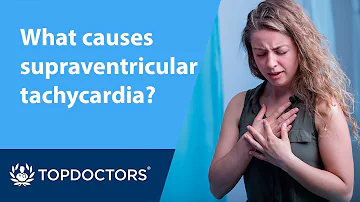How does a doctor diagnose SVT?
Your doctor may diagnose SVT based on a physical exam, your symptoms and history, and a test called an electrocardiogram (EKG, ECG). You may need other tests such as an electrophysiology study, blood tests, chest X-rays, or an echocardiogram to identify what type of SVT you have or find the cause.
How do you know if you have SVT?
Signs and symptoms of supraventricular tachycardia may include:
- Very fast (rapid) heartbeat.
- A fluttering or pounding in the chest (palpitations)
- A pounding sensation in the neck.
- Weakness or feeling very tired (fatigue)
- Chest pain.
- Shortness of breath.
- Lightheadedness or dizziness.
- Sweating.

Can SVT be diagnosed by ECG?
SVT can be diagnosed by your doctor through a physical exam and questions about what triggers your fast or irregular heart rate. Tests include X-rays or an electrocardiogram (EKG, ECG) to measure the heart's electrical activity and record SVT events.
What can be mistaken for SVT?
Supraventricular Tachycardia (SVT) is the heart arrhythmia most likely to be mistaken for a panic attack. It can make heart beat as much as 150 to 250 times a minute. One of the similarities between both panic attacks and SVT is the rapid action of the heart [4].
At what heart rate does SVT start?
If you have supraventricular tachycardia (SVT) you'll usually feel your heart racing in your chest or throat and a very fast pulse (140-180 beats per minute). You may also feel: chest pain.
What does an SVT episode feel like?
If you have supraventricular tachycardia (SVT) you'll usually feel your heart racing in your chest or throat and a very fast pulse (140-180 beats per minute). You may also feel: chest pain. dizziness.
Is SVT a lifelong condition?
For some patients, most or all of their SVT episodes may cease on their own; other patients require medical intervention. The management of SVT can be classified as short term (immediate/acute) or long term.
What triggers SVT attacks?
SVT is caused by an electrical short circuit in the heart. In most cases the patient is born with this short circuit but the short circuit may be a result of other heart disease. However, in most cases the heart is completely normal apart for the electrical short circuit.
Does SVT damage the heart?
In the vast majority of cases SVT is a benign condition. This means that it will not cause sudden death, will not damage the heart or cause a heart attack and will not shorten life expectancy.
Is SVT hard to diagnose?
Getting a diagnosis of SVT can be challenging. This is because your doctor will need an ECG that shows the rhythm of your heart during an episode of SVT. If your episodes are infrequent and last only a few seconds or minutes, this can be difficult to capture.
Is SVT considered heart failure?
Supraventricular tachycardia (SVT) causing heart failure and tachycardia-induced cardiomyopathy (TIC) are often used interchangeably. Although SVT is the most common cause of TIC, it is a broad term that also includes heart failure caused by ventricular arrhythmias.
Is SVT a serious heart condition?
Supraventricular tachycardia (SVT) is a condition where your heart suddenly beats much faster than normal. It's not usually serious, but some people may need treatment.
How long do SVT episodes last?
The heart rate during SVT is usually between 120-240 beats-per-minute. SVT can last for a few seconds or may last for several days.
Does SVT shorten your life?
In the vast majority of cases SVT is a benign condition. This means that it will not cause sudden death, will not damage the heart or cause a heart attack and will not shorten life expectancy.
Should I be worried about SVT?
SVT is rarely life threatening. But you may need treatment in hospital if you keep having long episodes. This may include: medicines to control the episodes of SVT – given as tablets or through a vein.
How long can you stay in SVT?
The heart rate during SVT is usually between 120-240 beats-per-minute. SVT can last for a few seconds or may last for several days.
What age is SVT common?
Although the set-up for SVT is often present at birth, the symptoms can start at any time. The episodes seem to occur more during infancy, then again at around 7 to 8 years of age, and then during the teen-age years.
Does SVT ever go away?
- SVT can go away on its own, with medication, or with certain actions used to slow heart rate: holding your breath, coughing, or immersing your face in cold water.
